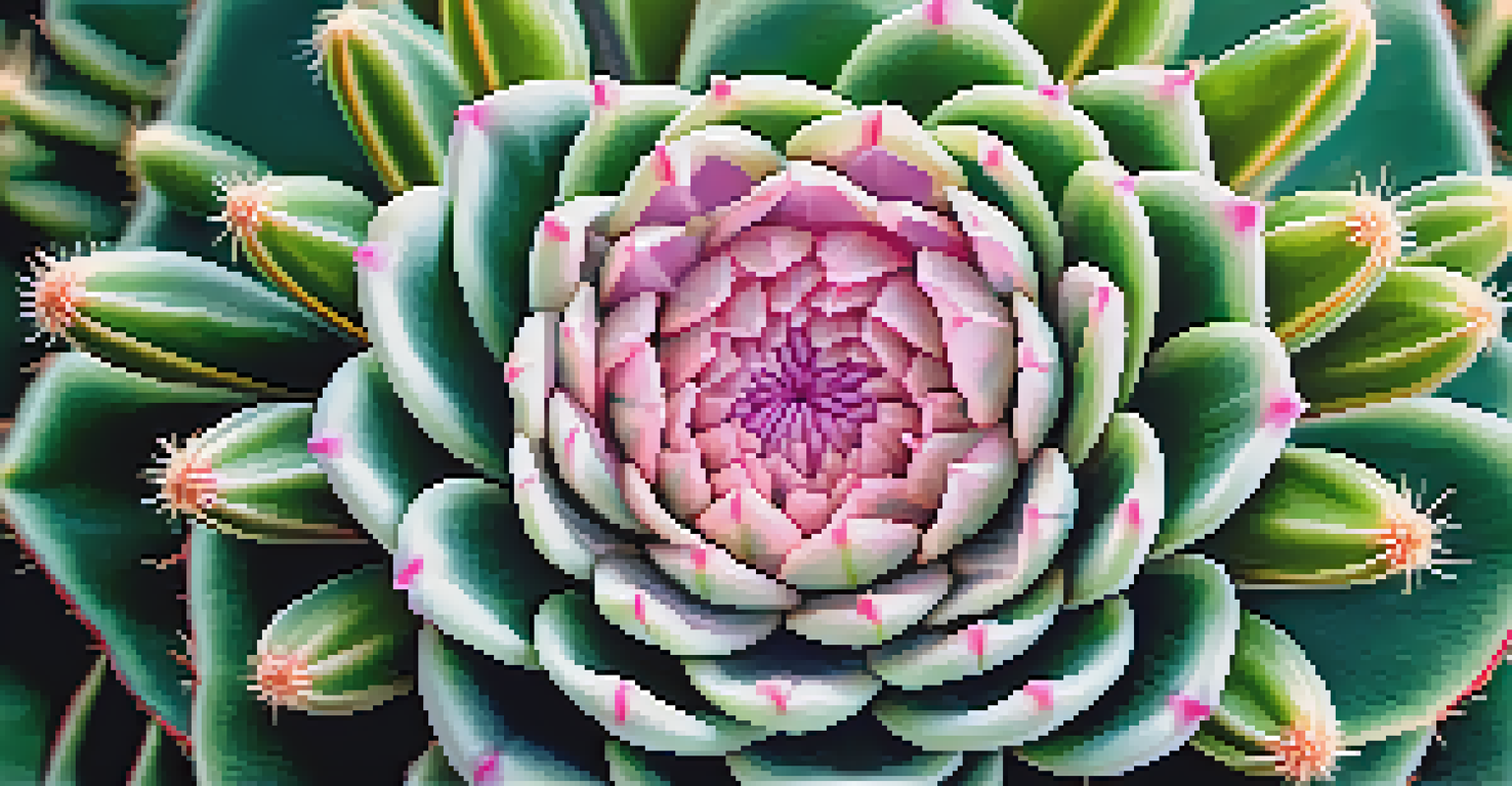Psychoactive Properties of Peyote: A Scientific Overview

Introduction to Peyote and Its Uses
Peyote, a small cactus native to the southwestern United States and Mexico, has been used for centuries in spiritual and healing ceremonies. Its psychoactive properties stem mainly from the compound mescaline, which is responsible for the hallucinogenic effects experienced by users. Indigenous cultures hold peyote in high regard, utilizing it for religious rituals and as a means to connect with the spiritual world.
Psychedelics can help us confront our deepest fears and traumas, allowing us to emerge on the other side with a greater sense of clarity and purpose.
Historically, peyote has played a significant role in various Native American traditions, particularly in the Native American Church. The use of peyote in these contexts is often seen as a way to gain insights, seek guidance, and promote healing. Understanding peyote's cultural significance helps contextualize its psychoactive properties within a framework of respect and reverence.
In recent years, there has been a growing interest in the scientific study of peyote, particularly regarding its potential therapeutic applications. As researchers explore the effects of mescaline, they are uncovering new insights into how this ancient cactus can impact mental health and well-being.
The Chemistry Behind Peyote's Psychoactive Effects
The primary psychoactive component of peyote is mescaline, a naturally occurring psychedelic compound. Mescaline works by interacting with serotonin receptors in the brain, primarily the 5-HT2A receptor, which plays a vital role in mood, perception, and cognition. This interaction leads to altered states of consciousness, vivid visual hallucinations, and profound changes in thought patterns.

In addition to mescaline, peyote contains other alkaloids that may contribute to its overall effects, though mescaline remains the most studied. The combination of these compounds can create a unique experience that varies among users. This variability is influenced by factors such as dosage, individual physiology, and the setting in which peyote is consumed.
Peyote's Cultural Significance
Peyote is revered in indigenous cultures as a sacred plant used for spiritual connection and community healing.
Understanding the chemistry of peyote is essential for both users and researchers. It provides insight into how this natural substance affects the brain and can help guide responsible use, especially in therapeutic contexts.
Effects of Peyote on Perception and Cognition
Users of peyote often report significant changes in sensory perception, including enhanced colors, sounds, and textures. This heightened awareness can lead to an immersive experience, where users feel more connected to their surroundings and themselves. Many describe it as a journey of self-discovery, where thoughts and emotions come to the forefront in a new and profound way.
The use of peyote in Native American Church ceremonies is a profound way to connect with the spiritual world and seek healing.
Cognitive effects can also include altered thought processes, where users may experience deep introspection or a sense of unity with the universe. These experiences can be enlightening but can also trigger anxiety or confusion, particularly if the user is unprepared for the intensity of the journey. Therefore, setting and mindset are crucial factors in determining the nature of the experience.
Research suggests that these altered states can have lasting effects on an individual's perspective on life and spirituality. Some studies indicate that people who use peyote report increased feelings of empathy, enhanced creativity, and improved mental health outcomes, pointing to its potential as a tool for personal growth.
Potential Therapeutic Applications of Peyote
Emerging research is exploring the therapeutic potential of peyote, particularly in treating conditions like depression, anxiety, and PTSD. Early studies suggest that mescaline may facilitate emotional breakthroughs, allowing individuals to process traumatic experiences in a supportive setting. This has led to interest in integrating peyote into therapeutic practices, particularly for those who have found limited success with traditional treatments.
The unique psychological experiences induced by peyote can provide profound insights into personal issues, helping users confront and understand their emotions. This therapeutic potential has prompted further investigation into how peyote can be used responsibly in clinical settings, with a focus on guided experiences that prioritize safety and support.
Therapeutic Potential of Mescaline
Research suggests mescaline may help treat conditions like depression and PTSD by facilitating emotional breakthroughs.
However, it's essential to approach this research with caution, as more data is needed to establish best practices for use. Understanding the risks and benefits of peyote is crucial for integrating it into modern therapeutic frameworks.
Cultural Perspectives on Peyote Use
The use of peyote is deeply rooted in various indigenous cultures, where it is often viewed as a sacred plant with significant spiritual meaning. For many Native American communities, peyote is more than just a substance; it is a conduit for connecting with ancestors and the divine. This cultural perspective informs how peyote is used in rituals and its importance in community healing practices.
Contrastingly, the Western perspective on peyote often focuses on its psychoactive effects, sometimes overlooking its cultural significance. This has led to debates about appropriation and the ethical considerations of using peyote outside its traditional contexts. A respectful understanding of these cultural dimensions is essential for anyone considering peyote use.
By acknowledging and honoring the cultural heritage of peyote, we can foster a more respectful dialogue around its use and potential benefits. This understanding can help bridge the gap between traditional practices and modern scientific exploration.
Legal Status and Regulation of Peyote
The legal status of peyote varies significantly across different regions, influenced by cultural and historical contexts. In the United States, peyote is classified as a Schedule I controlled substance, which means it is illegal for general use. However, there are exceptions for registered members of the Native American Church, allowing them to use peyote in religious ceremonies.
This legal framework highlights the complex interplay between cultural rights and drug policy. While some advocate for broader access to peyote for therapeutic purposes, others emphasize the need to protect its cultural significance and ensure that traditional practices are preserved. Balancing these interests remains a challenge for policymakers.
Legal Status and Cultural Rights
The legal classification of peyote varies, with special exceptions for indigenous use, highlighting the need to balance cultural rights and drug policy.
As research into the benefits of peyote continues to grow, discussions about its legal status may evolve. Advocates for reform argue that a more nuanced approach could allow for therapeutic use while respecting indigenous practices and rights.
Conclusion: The Future of Peyote Research
As interest in psychedelics for mental health treatment gains momentum, peyote stands out as a unique substance with rich cultural and therapeutic potential. Continued research is crucial to fully understand its effects, benefits, and the mechanisms behind its psychoactive properties. This scientific inquiry not only honors the historical significance of peyote but also opens doors for new therapeutic avenues.
The future of peyote research will likely involve interdisciplinary collaboration, bringing together scientists, cultural experts, and mental health professionals. Such partnerships can ensure that studies are conducted ethically and respectfully, considering both scientific rigor and cultural context.

Ultimately, as we delve deeper into the world of peyote, we have the opportunity to reshape our understanding of psychedelics, integrating ancient wisdom with modern science to foster healing and personal growth.